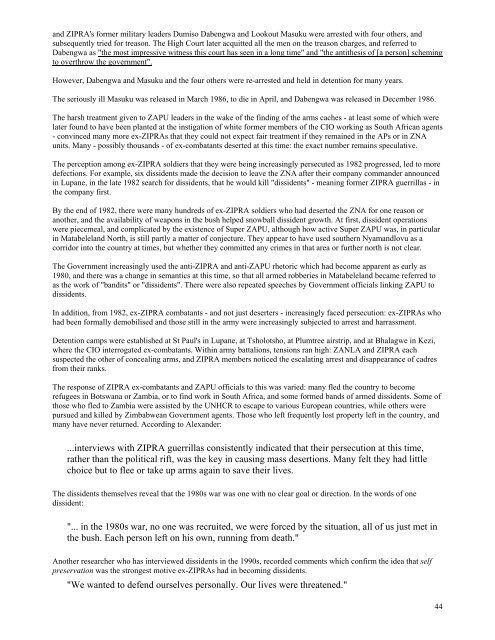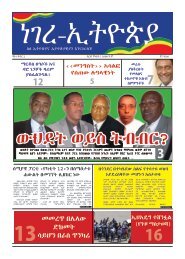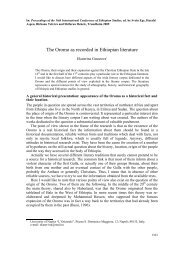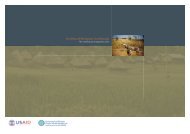MatabelelandReport
MatabelelandReport
MatabelelandReport
You also want an ePaper? Increase the reach of your titles
YUMPU automatically turns print PDFs into web optimized ePapers that Google loves.
and ZIPRA's former military leaders Dumiso Dabengwa and Lookout Masuku were arrested with four others, and<br />
subsequently tried for treason. The High Court later acquitted all the men on the treason charges, and referred to<br />
Dabengwa as "the most impressive witness this court has seen in a long time" and "the antithesis of [a person] scheming<br />
to overthrow the government".<br />
However, Dabengwa and Masuku and the four others were re-arrested and held in detention for many years.<br />
The seriously ill Masuku was released in March 1986, to die in April, and Dabengwa was released in December 1986.<br />
The harsh treatment given to ZAPU leaders in the wake of the finding of the arms caches - at least some of which were<br />
later found to have been planted at the instigation of white former members of the CIO working as South African agents<br />
- convinced many more ex-ZIPRAs that they could not expect fair treatment if they remained in the APs or in ZNA<br />
units. Many - possibly thousands - of ex-combatants deserted at this time: the exact number remains speculative.<br />
The perception among ex-ZIPRA soldiers that they were being increasingly persecuted as 1982 progressed, led to more<br />
defections. For example, six dissidents made the decision to leave the ZNA after their company commander announced<br />
in Lupane, in the late 1982 search for dissidents, that he would kill "dissidents" - meaning former ZIPRA guerrillas - in<br />
the company first.<br />
By the end of 1982, there were many hundreds of ex-ZIPRA soldiers who had deserted the ZNA for one reason or<br />
another, and the availability of weapons in the bush helped snowball dissident growth. At first, dissident operations<br />
were piecemeal, and complicated by the existence of Super ZAPU, although how active Super ZAPU was, in particular<br />
in Matabeleland North, is still partly a matter of conjecture. They appear to have used southern Nyamandlovu as a<br />
corridor into the country at times, but whether they committed any crimes in that area or further north is not clear.<br />
The Government increasingly used the anti-ZIPRA and anti-ZAPU rhetoric which had become apparent as early as<br />
1980, and there was a change in semantics at this time, so that all armed robberies in Matabeleland became referred to<br />
as the work of "bandits" or "dissidents". There were also repeated speeches by Government officials linking ZAPU to<br />
dissidents.<br />
In addition, from 1982, ex-ZIPRA combatants - and not just deserters - increasingly faced persecution: ex-ZIPRAs who<br />
had been formally demobilised and those still in the army were increasingly subjected to arrest and harrassment.<br />
Detention camps were established at St Paul's in Lupane, at Tsholotsho, at Plumtree airstrip, and at Bhalagwe in Kezi,<br />
where the CIO interrogated ex-combatants. Within army battalions, tensions ran high: ZANLA and ZIPRA each<br />
suspected the other of concealing arms, and ZIPRA members noticed the escalating arrest and disappearance of cadres<br />
from their ranks.<br />
The response of ZIPRA ex-combatants and ZAPU officials to this was varied: many fled the country to become<br />
refugees in Botswana or Zambia, or to find work in South Africa, and some formed bands of armed dissidents. Some of<br />
those who fled to Zambia were assisted by the UNHCR to escape to various European countries, while others were<br />
pursued and killed by Zimbabwean Government agents. Those who left frequently lost property left in the country, and<br />
many have never returned. According to Alexander:<br />
...interviews with ZIPRA guerrillas consistently indicated that their persecution at this time,<br />
rather than the political rift, was the key in causing mass desertions. Many felt they had little<br />
choice but to flee or take up arms again to save their lives.<br />
The dissidents themselves reveal that the 1980s war was one with no clear goal or direction. In the words of one<br />
dissident:<br />
"... in the 1980s war, no one was recruited, we were forced by the situation, all of us just met in<br />
the bush. Each person left on his own, running from death."<br />
Another researcher who has interviewed dissidents in the 1990s, recorded comments which confirm the idea that self<br />
preservation was the strongest motive ex-ZIPRAs had in becoming dissidents.<br />
"We wanted to defend ourselves personally. Our lives were threatened."<br />
44







